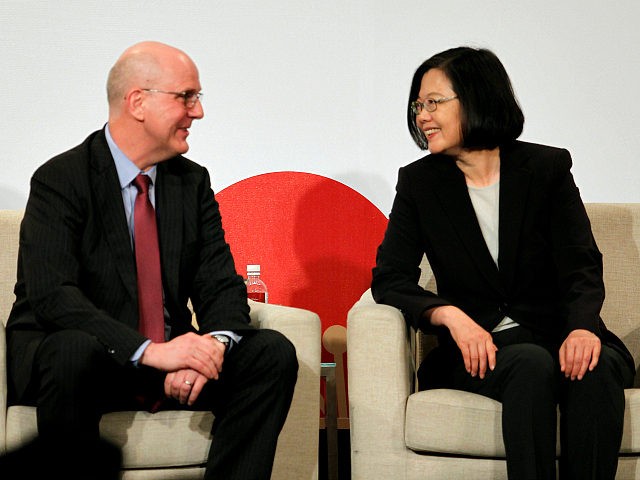A senior U.S. State Department official traveled to Taiwan this week to commemorate the 40th anniversary of the Taiwan Relations Act in a sign of U.S. support for Taiwan.
U.S. Deputy Assistant Secretary of State David Meale traveled to Taipei, delivering remarks at a banquet hosted by the American Chamber of Commerce on Wednesday, according to a report by Taiwanese media outlet Focus Taiwan.
Meale, the deputy assistant secretary for trade policy negotiations in the Bureau of Economic and Business Affairs, predicted U.S. and Taiwan relations would continue to prosper.
“As we ponder the anniversary of the TRA, I will take a moment to make a few predictions,” he said, according to the report. “First, the relationship between the United States and Taiwan will continue both to prosper and to enhance the prosperity of those who participate in U.S.-Taiwan commercial interaction on both sides of the Pacific.”
Meale also noted that Taiwan is America’s 11th largest trading partner and the U.S. is Taiwan’s second largest trading partner.
Taiwanese President Tsai Ing-wen spoke at the dinner. The visit was sure to anger China, which opposes any high-level contacts between U.S. officials and Taiwanese officials.
The Taiwan Relations Act (TRA) was signed in April 1979 by then-President Jimmy Carter after the U.S. switched diplomatic recognition from Taipei to Beijing in the midst of the U.S.-Soviet Cold War.
The TRA provides the legal basis for unofficial diplomatic relations between the U.S. and Taiwan, however, including a U.S. commitment to provide Taiwan with self-defense capability.
Under the Trump administration, those relations have grown stronger.
The Trump Defense Department began publicizing its naval transits in the Taiwan Strait for the first time in decades in a show of support for Taiwan, as Breitbart News first exclusively reported.
The Trump State Department has approved more arms sales to Taiwan than under the Obama administration.
The Trump White House has also stepped up its rhetoric in support of Taiwan, blasting China for “Orwellian nonsense” in its demand that American airlines recognize Taiwan as part of China.
National Security Adviser John Bolton recently rebuked China after its military jets crossed the center line in the Taiwan Strait and said the “Taiwan Relations Act and our commitment are clear”:
And the U.S. Congress has also passed several bills to strengthen U.S. support for Taiwan, including the Taiwan Travel Act that allows for high-level visits between the U.S. and Taiwan.
Tsai visited the U.S. last month in a visit to Hawaii where she addressed an audience at the Heritage Foundation think tank in Washington, DC, via live stream.
She said in her remarks, “Taiwan does not stand alone. The United States commitment to Taiwan is stronger than ever.”
The growing support has roiled Beijing, which has stepped up its efforts to isolate Taiwan internationally. China maintains that Taiwan is part of China, not a sovereign country.
Chinese nationalists fled China in 1949 after losing a civil war with Chinese communists, and they established a new government that is today a thriving democracy. Taiwan prides itself in being the only Chinese-speaking Democratic country.
Meale said that the U.S. would “remain steadfast in all of its commitments to Taiwan, reflecting the enduring nature of our shared interests.”
He also said the U.S. will continue to support the “positive trajectory of U.S.-Taiwan economic relations” and called Taiwan “a democratic success story, a reliable partner, and a force for good in the world.”
Meale said it is important to continue bilateral cooperation in the areas of innovation, intellectual property rights protection, and investment.
He will spend a week in Taiwan and is scheduled to open a U.S.-Taiwan workshop on stopping digital piracy and protecting trade secrets, according to Focus Taiwan. He will also have discussions with Taiwanese officials on a range of issues related to the U.S.-Taiwan relationship.

COMMENTS
Please let us know if you're having issues with commenting.